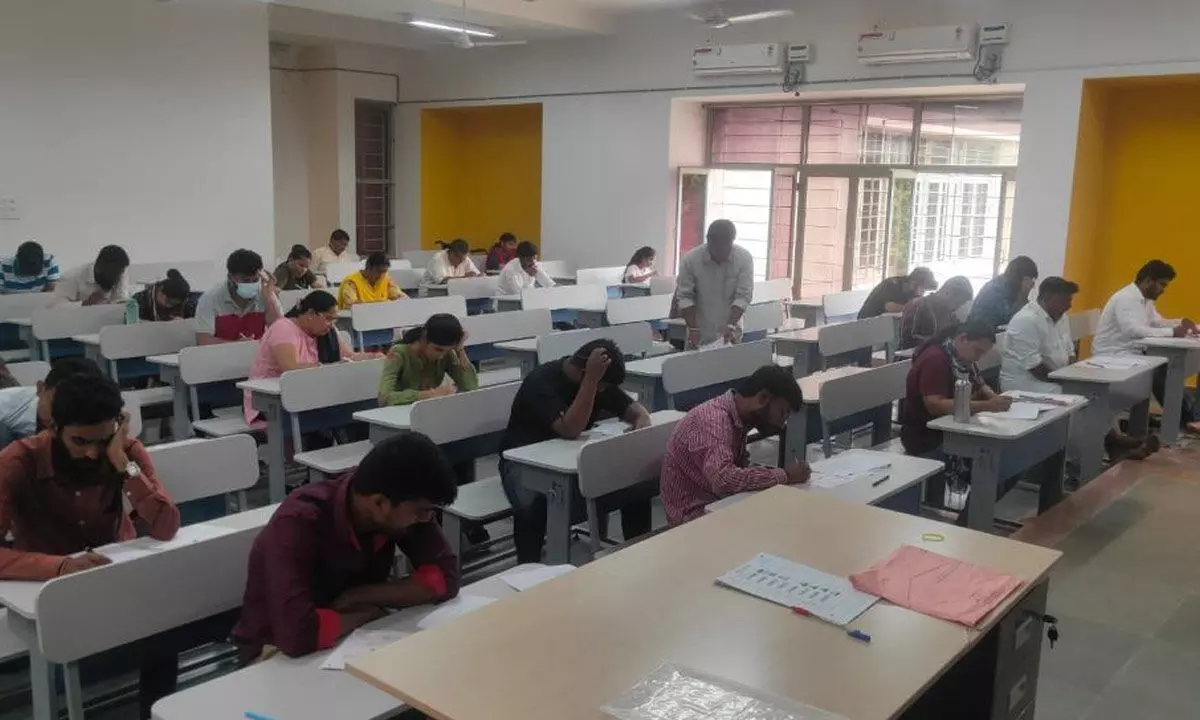Live
- They always want me to win, and now I feel lucky to have been offered a story like ‘Zebra’: Satyadev Kancharana
- ‘Democracy first, humanity first’: PM Modi in Guyana's parliament on two countries' similarities
- PKL Season 11: Telugu Titans register third straight win to top standings
- Is Pollution Contributing to Your COPD?
- NASA Unveils Underwater Robots for Exploring Jupiter's Moons
- Additional Central forces arrive in violence-hit Manipur
- AR Rahman and Saira Banu’s Divorce: Legal Insights into Common Issues in Bollywood Marriages
- 82.7 pc work completed in HPCL Rajasthan Refinery area: official
- Curfew relaxation extended in 5 Manipur districts on Friday
- Tab scam prompts Bengal govt to adopt caution over fund disbursement
Just In
Not the right time to implement UGC’s One Nation-One Entrance for PhD?


The University Grants Commission (UGC)’s One Nation-One Entrance for admission into PhD to bring uniformity for standards across all the state and central universities stands on an ambitious idea. However, it is not a practical step to be implemented for now for multiple reasons, including opposition from the students.
Hyderabad: The University Grants Commission (UGC)’s One Nation-One Entrance for admission into PhD to bring uniformity for standards across all the state and central universities stands on an ambitious idea. However, it is not a practical step to be implemented for now for multiple reasons, including opposition from the students.
Speaking to The Hans India, a top official from the State Higher Education Department points out that Telangana State is already complying with the UGC criteria of admitting students of NET-JRF under the first preference category. This apart, "Earlier, there was only four to five per cent reservation for students from Jammu and Kashmir. But, the state universities have increased the national integration quota up to 20 per cent in the admissions." Further, "We are trying to accommodate students from other states in one or the other colleges to ensure that they get admissions in different streams."
Secondly, for years, the UGC has been conducting the UGC-NET-JRF and CSIR-UGC NET in a bilingual format of English and Hindi media. Students studying in the Telugu states studying in Telugu medium till their undergraduate courses and studying only their postgraduate in the English medium lack a level playing field with their counterparts from the English and Hindi mediums.
It makes it more reasonable for the Telugu states to keep the State Entrance Tests (SET) or University Level Entrance Tests (ULET) for admission into the PhD courses. The mix and match of scholars with UGC-JRF and those with the SET/ULET continue to hold good for the time being given the changing dynamics of the education landscape and the decisions UGC is taking in the wake of the New Education Policy 2020.
Additionally, the UGC should focus more on the problem of in-breeding that the State Universities are facing and impacting the standards of teaching and research, unlike their counterparts in the central and national universities.
When asked why a PhD holder from Himachal Pradesh or Jammu and Kashmir or from some other states in the country is not recruited in the State Universities, a senior Professor from Social Sciences of Osmania University said, "The number of PhD holders with SETs/ULET recruited in the central and national universities is nominal vis a vis their counterparts. However, it was only after the advantage of the private universities that those qualified in the SET/ULET are being recruited more in number," says another professor from Osmania University.
Further, reducing grant support to the state universities from the UGC other than the RUSA route is an area of concern that the UGC has to address to step up the intellectual capital, research and innovation.
The NEP-2020 talks about the decolonisation of education and industrial linkages for innovation and creativity. At the same time, the lack of bankability of patents, patent-insurance-related issues and the policy changes needed were among the other concerns that need to be addressed by the appropriate government to accrue anticipated dividends out of full roll-out of the NEP-2020.

© 2024 Hyderabad Media House Limited/The Hans India. All rights reserved. Powered by hocalwire.com






